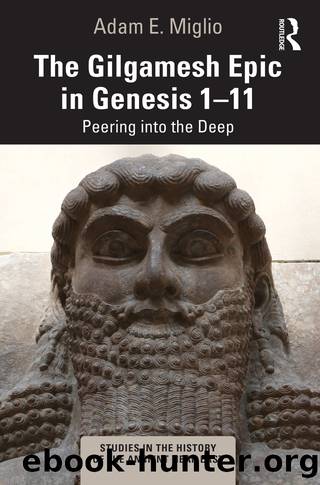The Gilgamesh Epic in Genesis 1-11 by Adam E. Miglio;

Author:Adam E. Miglio;
Language: eng
Format: epub
Publisher: Taylor & Francis (Unlimited)
Published: 2023-06-15T00:00:00+00:00
Conclusion
The first âactsâ of the Gilgamesh Epic61 and Genesis 1â11, while beginning with exemplary humans who possess extraordinary abilities, issue audible warnings about the limits of their potential that rumble through the narratives. Gilgamesh is introduced as abounding with potential in Tablet I, and this potential is then explored through his journey to the Cedar Forest and return back home as a hero in Tablet VIII. In the course of his quest, the sounds of birds reverberate through the scenes in the Cedar Forest, are found on the lips of Enkidu, and shriek at the death of Humbabaâs sons (Tablet V). In each instance, these sounds are narratological warnings about the limits Gilgamesh and Enkidu should not transgress. Like omens, they caution against the pairâs imperious ambitions. Then, after the pair despoils the Cedar Forest and kills Humbaba, Enkiduâs vision of the Underworld anticipates that their transgression will be fittingly punished by descending among the bird-like dead (Tablet VII). Similarly, the patterned soundscape of a ânoiseâ (qÅwl) followed by a divine malediction alerts readers to divinely imposed limits on humanity. Moreover, within Gen. 2:4bâ4:26, this pattern is innovated. The God YHWH initially makes the âsoundâ (qÅwl) in the garden (Gen. 2:4bâ3:24), but thereafter he grows increasingly disassociated with the âsoundâ (qÅwl) in the narrative as it is more and more closely connected with flagrantly violent behavior (Gen. 4:1â26). At the same time, the divine curses limiting humanity grow shorter in the vignettes of Gen. 2:4bâ4:26 until they are altogether missing from the account of Lamech.
At the midpoint of these two compositions, there is a notable difference between the soundscape of the Primeval History and that of the Gilgamesh Epic. In Tablet VII, the Gilgamesh Epic crescendos in divine judgment when the heavenly council decrees the death of Enkidu. This fixed declaration is crucial to the story. It is Enkiduâs death that forces Gilgamesh to seek out Uta-napishti, the lone survivor of the Flood. In the Primeval History, by comparison, divine speech is the primary force driving the action in Gen. 1:1â2:3, and it continues to be a significant force in the garden story (Gen. 2:4bâ3:24) and even, if to a lesser degree, the account of Cain and Abel (Gen. 4:1â16). Yet, in the vignette about Lamech, there is divine silence. And by Gen. 4:26, YHWH is invoked, but since he does not respond to Lamechâs abuse of power, one is left to wonder if this appeal will also go unheeded. Thus, Gen. 2:4bâ4:26 concludes its storyline leading up to the Flood (Gen. 6:1â9:28) with the absence of any divine response to humanityâs intensifying misuses of power, rather than with an unequivocal divine decree as in the Gilgamesh Epic. The next chapter, therefore, takes up the Flood traditions and considers how they attempt to explain the nature of divine engagements with humanity.
Download
This site does not store any files on its server. We only index and link to content provided by other sites. Please contact the content providers to delete copyright contents if any and email us, we'll remove relevant links or contents immediately.
| African | Asian |
| Australian & Oceanian | Canadian |
| Caribbean & Latin American | European |
| Jewish | Middle Eastern |
| Russian | United States |
4 3 2 1: A Novel by Paul Auster(11074)
The handmaid's tale by Margaret Atwood(6875)
Giovanni's Room by James Baldwin(5896)
Big Magic: Creative Living Beyond Fear by Elizabeth Gilbert(4736)
Asking the Right Questions: A Guide to Critical Thinking by M. Neil Browne & Stuart M. Keeley(4599)
On Writing A Memoir of the Craft by Stephen King(4221)
Ego Is the Enemy by Ryan Holiday(4003)
Ken Follett - World without end by Ken Follett(3983)
The Body: A Guide for Occupants by Bill Bryson(3816)
Bluets by Maggie Nelson(3724)
Adulting by Kelly Williams Brown(3681)
Guilty Pleasures by Laurell K Hamilton(3601)
Eat That Frog! by Brian Tracy(3527)
White Noise - A Novel by Don DeLillo(3443)
The Poetry of Pablo Neruda by Pablo Neruda(3371)
Alive: The Story of the Andes Survivors by Piers Paul Read(3320)
The Bookshop by Penelope Fitzgerald(3237)
The Book of Joy by Dalai Lama(3236)
Fingerprints of the Gods by Graham Hancock(3223)
